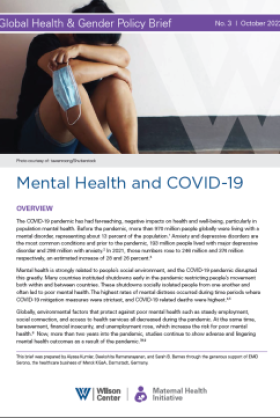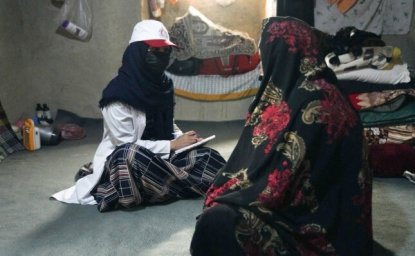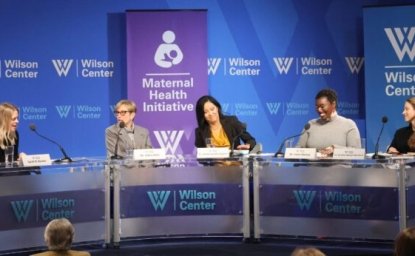Global Health & Gender Policy Brief: Mental Health and COVID-19


The COVID-19 pandemic has had far-reaching, negative impacts on health and well-being, particularly in population mental health. Mental health is strongly related to people’s social environment, and the COVID-19 pandemic disrupted this greatly. Many countries instituted shutdowns early in the pandemic restricting people’s movement both within and between countries. Shutdowns socially isolated people from one another and often led to poor mental health. The highest rates of mental distress occurred during time periods when COVID-19 mitigation measures were strictest and the number of COVID-19 related deaths was highest.
Globally, environmental factors that protect against poor mental health such as steady employment, social connection, and access to health services all decreased during the pandemic. At the same time, bereavement, financial insecurity, and unemployment rose, which increase the risk for poor mental health. Now, more than two years into the pandemic, studies continue to show adverse and lingering mental health outcomes as a result of the pandemic.
In a new policy brief, Mental Health and COVID-19, the Wilson Center’s Maternal Health Initiative explores the COVID-19 pandemic’s impact on the mental health of several especially vulnerable populations including adolescents and youth, pregnant people, and refugee and displaced persons. In addition, this brief details specific recommendations for policy makers and civil society to address the mental health impact of COVID-19 going forward.
Adolescents and youth are particularly at-risk of developing mental health conditions, which they often carry into adulthood. There is evidence that the COVID-19 pandemic has negatively impacted the mental health of young people, resulting in various adverse health outcomes and risky health behaviors. The prevalence of clinical depression and anxiety more than doubled from 8.5 percent and 11.6 percent prior to 2020 to 25.2 and 20.5 percent, respectively in 2021.
During the COVID-19 pandemic, increases in maternal deaths, pregnancy losses, and maternal depression suggest the added stressors of the pandemic have negatively impacted the health of parents, pregnant people, and children. Pregnant and post-partum people are already vulnerable to mental health challenges, and their risk of developing mental health issues are elevated compared to the general population. Globally, around 10-35 percent of women experience depression during pregnancy and the postpartum period. Increased isolation from the COVID-19 pandemic and uncertainty about how COVID-19 infection impacts pregnancy both contributed to the added stress and strain on pregnant people.
Amid the ongoing COVID-19 pandemic, active conflict, violence, and oppression have continued to displace people. People and families who are displaced face a multitude of stressors which impact their mental health. Traumatic experiences and mental health conditions are common among refugees, as many have dealt with conflict, war, torture, and incarceration, while being forced from their homes and families. Those who experienced more perceived discrimination as a result of the pandemic reported worse mental health outcomes. Refugees and displaced people who are undocumented or temporarily documented, have insecure housing, and/or live in the street or asylum centers had worse mental health outcomes during the COVID-19 pandemic than their counterparts.
Greater investments are necessary in data, research, and policy making focused on the significance of population mental health. Increasing financial investment in mental health related education, prevention, screening, and treatment is a critical step to address the drivers of population mental health among adolescents and youth, pregnant people, and refugee and displaced people.. In addition, policy makers and mental health programs must increase available resources and support services dedicated to the mental health of populations most at risk.
Authors

Maternal Health Initiative
Housed within the Wilson Center's Environmental Change and Security Program, the Maternal Health Initiative (MHI) leads the Wilson Center’s work on maternal health, global health equity, and gender equality. Read more

Explore More
Browse Insights & Analysis
Mexico Is Growing Old. Can It Build a Care System in Time?

Afghanistan Widows: The Silent Struggle of Women-Headed Households

Closing the Women’s Health Gap: Research, Investment, and Eliminating Inequities


